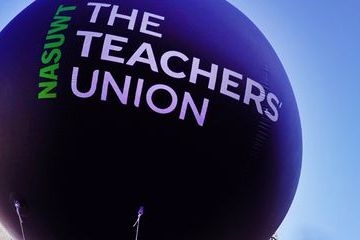
Teachers are tired - of being undervalued, underpaid, and feeling unheard - and Matt Wrack knows this.
Since taking the helm at NASUWT in the summer, the new General Secretary has been listening to and meeting with members across the country, challenging government complacency, and calling for a bold, collective fightback to put education high up on the political agenda.
He spoke to the NASUWT's magazine Teaching Today about the state of the profession and the pressures facing teachers, the dangers of division, and why union organising is more vital than ever.
“We’ve had over 14 years of austerity,” he says. “Attacks on wages, pensions and public services. Teachers have felt the brunt of that - pay freezes, cuts to school budgets, changes to pensions. They are heartily sick of it.”
That frustration fuelled the election of a Labour government. But over a year into office, he sees little sign of the promised change.
“There’s quite a lot of anger. The unfunded pay rise for teachers in England, the failure to restore education spending - it’s all there in the figures. And the failure to address issues like the two-child cap or winter fuel support has undermined a lot of goodwill.”
He warns that unless Labour listens to trade unions and working people, it risks electoral backlash: “On current trends, they’ll do very badly in the local elections. Reform is gaining ground. It’s a worrying time.”
“People voted for change,” he adds. “But they’re still seeing overcrowded classrooms, crumbling buildings, and exhausted staff. That’s not the future they were promised.”
Schools on the Front Line
He believes education is not just a policy area - it’s a battleground for social justice and a driving force to lift young people out of poverty and to help them achieve their full potential.
“Schools are on the front line. Teachers are picking up the pieces from failing support elsewhere - youth clubs have closed, poverty in families, lack of housing, unemployment. All of that feeds into the classroom.”
He believes schools can and do play a transformative role in rebuilding communities but that needs to be backed by serious investment and joined-up thinking.
“We need a complete rethink of how we deliver public services,” he says. “That means talking to schools, parents, families, communities and of course teachers, about what that looks like.”
“Schools can be at the heart of rebuilding communities that have been left behind for decades.”
Standing Against Division
Matt is deeply concerned about the rise of far-right narratives, particularly in communities hit hardest by austerity.
“There’s a perception that the political system is broken,” he says. “And when people lack hope, divisive narratives take hold which blame migrants instead of tackling root causes like war, climate change, and inequality.”
He’s clear that teachers have a role to play in countering these narratives but they need support.
“We’ve heard of teachers being suspended for having classroom discussions,” he says.
“That’s unacceptable. NASUWT is working on how we can support teachers to have respectful, critical conversations by helping students navigate misinformation and develop independent thinking.”
He’s scathing about political interference from some politicians on the Right in education. “Calls for a ‘patriotic curriculum’ are chilling,” he says. “You’d expect that in countries without democratic traditions but not here.”
“We want communities to stand together…decent schools, hospitals, housing - that’s how you build unity, not by scapegoating the vulnerable.”
Funding: Where Has All the Money Gone?
In his interview and in speeches to members he returns often to the question of funding and the union’s campaign to expose profiteering in education.
“Education spending as a share of GDP has fallen from 5.7% to 4.1%,” he said. “You’re not going to solve problems in schools in terms of buildings, SEND provision, recruitment without long-term investment.”
He praised the Union’s report Where Has All the Money Gone? which highlights how academy chains, private SEN providers, exam boards, consultants and bloated chief executive salaries are draining resources.
“Academy trusts, supply agencies, exam boards, consultants are all taking money out of schools and putting it into profits,” he says. “We’ve created a system with no genuine democratic accountability.”
The industrial action by members at the Harris Federation, where redundancies were proposed despite the academy chain holding £21 million in reserves, is a case in point: “It shows why we need transparency and accountability.”
“We’ve got trusts sitting on millions while cutting staff,” he says. “That’s not just bad management, it’s a betrayal of children and teachers.”
Ofsted: A System That Punishes Schools
Matt is equally critical of the new inspection regime brought in by Ofsted, which he says was imposed without proper consultation.
“There’s a lot of anger. Teachers and school leaders feel the pressure - and the failure to listen has made it worse.”
He wants to see accountability systems that are supportive, not punitive. “We need ways to help schools address need - not simplistic ratings that penalise schools for the problems they inherit from local circumstances.”
He’s particularly concerned about the marketisation of education: “Schools feel forced to advertise their Ofsted ratings on banners,” he says. “We should be aiming for top-quality schools in every community which means greater investment in areas hit hardest by poverty. Not simplistic labels that ignore context.”
Organising for Change
Union organising is something Matt feels passionate about – and he wants members to see NASUWT as more than a safety net.
“People join NASUWT for protection knowing they will be supported and backed up and that’s completely valid,” he says. “But the union should also be a chance for members to shape the world of work - to raise issues about workload, health and safety, and campaign for change.”
He’s calling for more members to get involved at workplace and local levels. “That’s the lifeblood of the union,” he says. “We won’t turn things around from head office alone.”
One campaigning issue close to his heart is full maternity pay. “Teaching is 75–80% female,” he says. “Teaching is 75–80% female. Maternity provision in terms of pay is poor - and it’s forcing women back to work earlier than they’d like. Compared to other sectors and countries, it’s inadequate. Improving maternity pay should be a central campaign. It’s about fairness, retention, and respect.”
“We’ve got to be bold,” he says. “Whether it’s maternity pay, workload, or SEND provision — these are winnable fights if we’re organised.”
A Fresh Perspective
Matt comes to NASUWT from outside the education sector as he led the Fire Brigades’ Union for 20 years and sees this experience as a strength.
“I’ve lived through the pressures of teaching through my family,” he says. “And I bring experience from other sectors in organising, winning legal battles, attention to detail.”
He cites the landmark pension case won by the FBU which found pension changes in 2015 were discriminatory. “It benefited thousands of teachers,” he says. “And it shows what determination can achieve.”
What’s surprised him most since taking office? “The fragmentation of education,” he says.
“Academisation has created private interests that now influence national policy. It’s not good for teachers or for education.”
Some trusts are better than others,” he adds. “But the system itself is broken. We need a profession where teachers can move freely, without being penalised.”
A Message of Hope
Despite the challenges facing the profession he remains resolute and hopeful.
“We need a joined-up approach,” he says. “You can’t separate what happens in schools from what happens in the community, in youth services, housing, local government. It all affects the classroom.”
He’s optimistic about the role teachers can play in shaping that future. “It can’t be impossible to have a discussion where the views of teachers, parents, and communities are listened to,” he says. “We can find humane, progressive solutions if we’re willing to invest and organise.”
His final message is clear: “We want decent schools, hospitals, housing. We want communities where young people can thrive, wherever they’ve come from, whatever background they have. That’s the future we’re fighting for. It won’t be easy, and it won’t be cheap. But if we organise, campaign, and stand together - we can win.”




